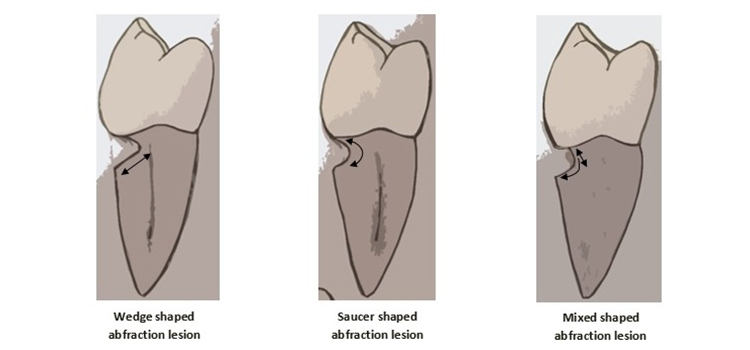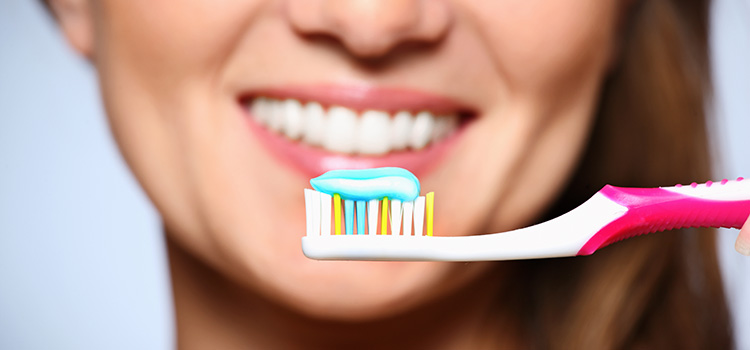What Are Tooth Abfractions?
18th Jan 2020

We’re all pretty familiar with cavities and what causes them. Either we remember lectures from the dentist about dental health to always brush after eating or concerned adults warning us not to chow down on candy. But did you know there are other types of tooth decay? Not all damage to teeth comes from soda and poor brushing habits. Sometimes it comes from tooth to tooth contact. While it may not sound like a big deal, clenching and grinding your teeth can harm them - to the point where it can result in dental abfractions. But how do you know if you have dental abfractions?

Image from Wikipedia
Maybe you noticed during your nightly brushing and flossing routine that your teeth have a sort of wedge or v-shaped notch near the gumline. If you run your fingernail up your tooth toward the gumline, you might be able to feel the notch. The exposed portion may be a different color, or you could experience tooth sensitivity. Yikes, right?
Now that we know what dental abfractions look like, let’s get into what they actually are and how you can get your oral health back on track!
What Is a Tooth Abfraction?
Abfraction means “to break away,” and that’s exactly what happens to the enamel and dentin on your teeth. Whenever a force is exerted on your teeth that causes flexion in the cervical area (where your gum line and tooth meet, it’s also known as the cementoenamel junction or CEJ) the stress results in tiny microfractures of the tooth structure, eventually giving rise to the notches on your tooth surface.
What Are the Causes of Abfraction?
Common causes for tooth abfractions can stem from bruxism ( teeth grinding), especially since you may not be aware you’re clenching or grinding your teeth. You might unconsciously be doing it while you troubleshoot a problem at work or even while you’re sound asleep.
Another factor could be due to a malocclusion, or teeth that don’t align properly. It’s frequently genetic but can also result from tooth loss, misalignment of jaw fractures after an injury, as well as poorly fitted crowns and fillings.
It’s important to note that each case is unique, and there may not be a singular cause in all cases of dental abfractions.

What Are the Consequences of Having Dental Abfractions?
While tooth abfractions may appear to solely be a cosmetic issue, that isn’t always the case. Remember how we talked about abfractions resulting from microfractures in the enamel and dentin? Well, when the tooth structure becomes compromised, your oral health is at risk.
Your tooth enamel is the outermost protective layer of your teeth, and underneath it is your dentin, which can transmit pain, pressure, and temperature to the nerves of your teeth. Exposed dentin means that you could experience sensitivity and discomfort while enjoying your favorite foods.
Without its protective layers of tooth enamel and dentin, your pulp cavity and root canal are more prone to infection too. It sounds painful just reading it. With the loss of tooth structure, you are opening yourself up to complications.

What Are Your Treatment Options?
Not all dental abfractions require immediate treatment. Depending on the severity of your abfraction lesions, regular check-ups at 6-12 month intervals can suffice. Generally, the type of tooth wear that causes abfractions is a slow and chronic process.
If you’re suffering from tooth sensitivity every time you eat a bowl of ice cream or sip on some herbal tea, you might find relief with desensitizing toothpaste .
Not to fear if you’ve been through every brand on the shelf. There are many treatment options your dentist can help you with, from applying an adhesive layer to fluoride varnish and even laser treatment.
Lastly, restorative dentistry may be the right choice. Just like a cavity, your dentist can fill the area with composite resin. Another option is a crown - it can be placed over an affected tooth to restore its strength, shape, size, and appearance.
How You Can Prevent Tooth Abfractions
Fortunately, there are steps you can take to prevent tooth abfractions that won’t break the bank. Depending on the cause of your dental abfractions, managing your stress with lifestyle choices could be a step in the right direction by minimizing clenching or tooth grinding.
Another affordable choice you can go with is a custom mouth guard for grinding your teeth or simply a night guard. There are different options available depending on whether you lightly clench your teeth, suffer from severe bruxism, or are somewhere in between!
By providing a cushion, you’re minimizing the amount of flexion and pressure your teeth are subjected to while preserving the integrity of your tooth structure.
If you’re concerned about suffering from dental abfractions, it pays dividends to make a trip to the dentist to see if your teeth are correctly aligned. Even if you have a malocclusion, there are several ways to correct it, ranging from braces, removing teeth to prevent overcrowding, and surgery to reshape the jaw.
Related Articles:
Dental Abfractions vs. Dental Abrasions
A quick note - while similar sounding in name, there is a difference between abfractions and abrasions. As previously mentioned, abfractions can be caused by tooth to tooth contact. In contrast, abrasions are typically caused by external forces coming into contact with teeth. Some examples of this are poor toothbrushing technique or using a toothbrush with hard bristles, chewing on nails or pens, and pipe smoking, to name a few.
While it might be concerning to find out you have dental abfractions, it’s nothing to lose sleep over! There are a number of ways you can treat and prevent them from getting worse and improve your dental health.
Sources:

- Most Popular
- Hard Outside, Soft Inside
- 2MM Thick
- Moderate / Heavy

- Most Durable
- Hard Materials
- 1.5MM Thick
- Heavy / Severe

- For Day Time Use
- Thin, Barely Visible
- 1MM Thick
- Light / Moderate

- For Clenching
- Flexible & Soft
- 1.5MM Thick
- Light / Moderate

